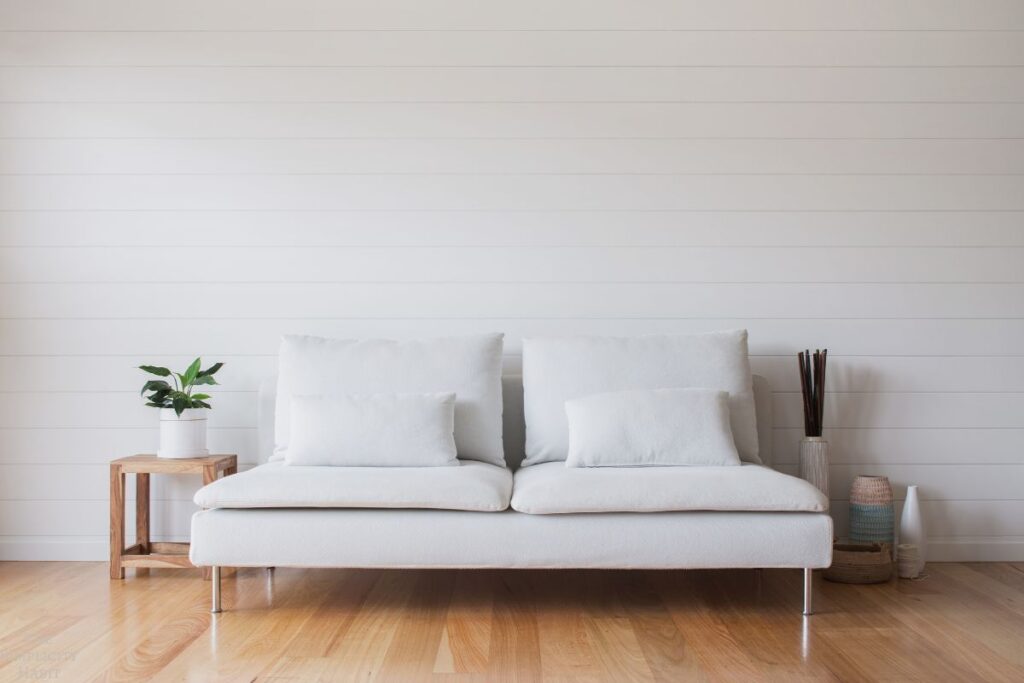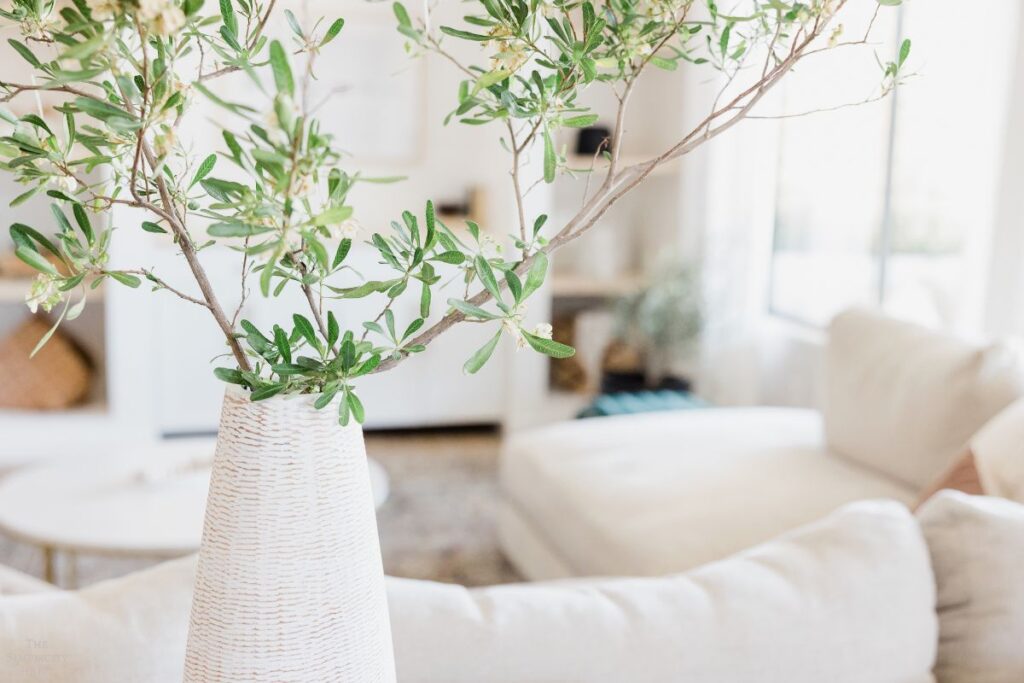Inside: Do these five reasons why you don’t want to live minimally resonate with you? Learn how you can overcome them and simplify your life.
A guest post by Cora Gold
The topic of minimalist living is everywhere, from checkout-line magazines to books, youtube channels, and blog posts with various people sharing its ability to make you happier and freer.
However, not everyone is equally excited about the benefits touted as a result of living with less. If the thought of minimalism makes you uneasy, have you mindfully explored why you don’t want to live minimally?
Maybe it’s a case of healthy skepticism regarding the press. “What’s this now, are the powers that be trying to make me content with less for a reason?” Perhaps it’s a well-justified fear that giving up your possessions means missing items when you need them most.
But to be clear, that is not what simple living is. It’s about getting rid of the excess so that you can focus on the things that do matter.
And you can benefit from this lifestyle philosophy without radically upending your daily habits or decreasing your standard of living.
If anything, you’ll be happier once you reap the benefits of liberating yourself from your addiction to stuff.
Here are five reasons people give for not living minimally — and their solutions.

Reasons Why You Don’t Want to Live Minimally
Here are a few common reasons why you don’t want to live minimally and how to move past them.
1. You don’t want to regret getting rid of something.
When asked why they don’t want to live minimally, one of the most frequent answers people give is the fear of regret. What if they donate or sell items they later decide they really want or need?
This potential fear keeps people from decluttering their homes and becomes the reason for holding on to far too many things. Belongings can have strong emotional ties.
It’s true that some items are irreplaceable, such as treasured sentimental items that may be one-of-a-kind. However, there are plenty of other things that could be replaced if needed. But it’s best not to get rid of things that you’d need to replace anyway. Living simply isn’t about being wasteful.
The goal of decluttering is to get rid of the items you no longer love or use. Knowing that can make it feel less intimidating and scary.
Also, when you consider the benefits of living with less it can serve as a helpful reminder when the fear of regret begins to kick in. As you continue to practice decluttering, it gets easier to let go.

2. You don’t love change.
Nearly everyone resists change, even when it’s a good change. If you need proof, think of how some people continue to refuse to quit smoking despite the risks or eat fast food day after day instead of packing a healthy lunch.
Much of the fear of change has to do with your mindset. Biologically speaking, anxiety and excitement are the same emotion.
Both produce symptoms like increased heart rate and respiration and a sensation of butterflies in your stomach. However, you connect one to the anticipation of joy and the other to fear, interpreting one as positive and the other as negative.
The solution is to make things fun and something to look forward to. For example, have a closet-cleaning party with several of your BFFs — you can swap garments you no longer wear, and rest assured they’re going to good homes.
Pump yourself up by playing uplifting music or plan a way to celebrate that you accomplished a goal when you’re done. There are things you can do to make decluttering a more enjoyable process.
Also, by focusing on what you’re gaining instead of what you’re getting rid of, you’ll help shift your perspective to a positive one.

3. You’re concerned that less is boring.
Many people are hesitant to consider minimalism because they think it will be boring. However, consider this principle: Your belongings are also your encumbrances.
The more you have, the more you need to spend your time, money, and mental space-maintaining those items and protecting them from thieves and the wear and tear of time.
Many people embrace minimalism because spending less time tending to their stuff means more hours available for doing the things they love.
Consider making a bucket list of all the fun activities you want to do once you switch to a more minimalist lifestyle. They may include items like:
- Spending weekends camping instead of cleaning your home and tending to your yard.
- Taking that dream vacation and spending your money on experiences rather than more things.
- Enjoying your kids’ soccer games on Saturday instead of working overtime to afford the payments on all of your toys.
It should also be noted that a minimalist space doesn’t have to be boring. You can infuse your personality and use minimalist design elements to create a space you love.
Adopting a minimalist lifestyle will be what you make of it. Own your journey and highlight the things that are important to you.

4. You’re worried about finances.
Here’s a big, legitimate fear of living minimally akin to that of giving away something you might later need. Some people who have survived past hard times cling to their possessions, thinking they might need to sell them later if money gets tight.
What if you worry about selling something you may later need? It’s unlikely you’ll run into trouble over a broach or antique chair, but it’s reasonable to fear giving away items you think you might use someday.
The pandemic has rendered such concerns legitimate, as 66% of American workers are worse off financially than a year ago, thanks to inflation and ongoing wage stagnation.
To solve this reason you don’t want to live minimally, carefully consider the items you let go of. The goal is not to get rid of things you’d need to replace. Be mindful of the things you declutter and consider what alterate items you could use to serve the same purpose.
Decluttering shouldn’t cost you money and in fact there are ways you can make money while decluttering your home.
A few of those ways are to have a yard sale or sell your unwanted items online. You could also consider reselling used electronics that you’re no longer using before they become obsolete. Another option is to make money by consigning items like antiques that still have a solid resale value.
While some of these sales may seem insignificant, they all add up and can help you set aside money to use toward an emergency fund or be reallocated to your monthly food budget.
Embracing minimalism will also help you to learn to shop differently going forward. You’ll save more money by being intentional with purchases and buying less unnecessary stuff.
Furthermore, minimalism frees up time which is a commodity you can’t get any more of.
5. You don’t want to upset family members.
You’re down for living minimally — but your partner loves to shop. Hardly a day goes by without them bringing some new trinket home from the store.
Being a minimalist living with a non-minimalist can definitely be a challenge.
The fear of upsetting others in your household is another reason for not living minimally, but this issue also has solutions. Perhaps the simplest is to have a heart-to-heart discussion with family members about spending habits.
Multiple factors drive purchasing behavior — your conversation could help you better understand your partner as you reach a compromise.
Teaching your children minimalism while they’re young is a fabulous idea. Instilling the value that people and experiences matter more than stuff decreases the risk they’ll adopt problematic patterns that plague them well into adulthood.
Sometimes, it’s kinder not to give into a case of the “gimmes,” especially if your child begins to develop an entitled attitude.
Family members can grow and change together as they begin to adopt a simpler way of living.

There Are Few Reasons Not to Live Minimally
Minimalist living has multiple benefits, including more time to do what you love with the people who matter most. It’s not a trick or a fad — there are considerable perks to removing the excess stuff that is weighing on you.
However, hesitating is natural, especially if you’ve experienced past economic insecurity. Fortunately, you can still reap the benefits of minimalist living — consider the solutions above, free yourself from endless maintenance, and start embracing a simpler life.

Cora Gold is the Editor-in-Chief of Revivalist magazine. She loves writing about family and living life to the fullest. Follow Cora on Twitter, Facebook and Pinterest.
What are the reasons why you don’t want to live minimally? Share them in the comments below.
Sign up on the form below to get weekly decluttering tips sent straight to your inbox. You’ll also get the free Your Home Decluttered Jumpstart which includes 100 easy items to declutter and 12 high-impact areas to declutter in 10 minutes.


I enjoy textures, layers, art, global design and an eclectic aesthetic. I have not yet encountered a minimalist home that allows this and a truly minimalist vibration. I find it is also a bit more challenging if one does not have especially rich nature views from the living spaces.
I’m an artist in a Nyc apartment. It’s a large apartment by local standards, still the paintings I made a love are everywhere. I haven’t found a way to live minimally except to scale down the amount of furniture and knickknacks. My partner is a paper packrat. Serious one. I’ve let her devote half the bedroom to her hoard of “ i might need this” I try to ignore it but it makes me feel chaotic
I live in a rich environment, and I love to look round me and enjoy all the possibilities of action I can see. It makes me happy. I’m fortunate in that I’ve got room to keep supports for the things I want to do, but my life would be poorer if I couldn’t design, create, make, maintain, entertain, garden . . and learn new things.
I can see that trying to live a perfectly organised life with a job, husband, small children makes one want to get rid of distractions. But this is only a phase in one’s life. When the people you love most don’t want to spend as much time with you as you’d like, when your children grow up and move away, when your partner is no longer with you, you need, for yourself, than a place to live stripped of things that could help you live your life fruitfully.
I’m pretty interested in the idea of decluttering. I think the main point is to do what works for you. For me, it does NOT mean chucking the books out or the paintings or rugs-it’s taking a clear look into the abyss of my closet …bins in the basement…boxes and boxes of stuff and saying-keep/repurpose, recycle, regift or donate, or sell and finally-garbage? I’ve never been so excited to get through tasks I’ve put off for fear of it taking ages when in reality-it’s 15 minutes on some days and others I get stuck in and it’s 2 hours- I find myself having some serious and some lighthearted inner conversations. It’s been 4 months and I haven’t missed or thought about anything twice. I have noticed I’m gaining more confidence in my ability to make decisions, set and keep track of my budget and goals. It’s definitely a process and I appreciate the fact the author addresses alllll the concerns and sticking points when I was first starting out- what if, well just in case…I could never…I’ve been stretched and challenged and frustrated and actually have done some seriously overdue inner work. Thank you for this well written article- it’s compassionate, straightforward, and helpful to remember your why!
About yard sales – my parents had a big one before moving to a smaller house . For maybe the next 10 years I would frequently hear them say that some item was sold in the yard sale and they wished they still had it. I was living another state at the time and was not able to get theren tow check for things I wanted beforehand. They sold old dolls of mine . Some of them are now worth big money – like my Shirley Temple doll. I am now in my 70s, with lots of clutter. But I am the one who has a lot of the irreplaceable family ithems – photos, books, china and silver. I donate clothes I no longer need and books to the library book sale. But no yard sales. 7